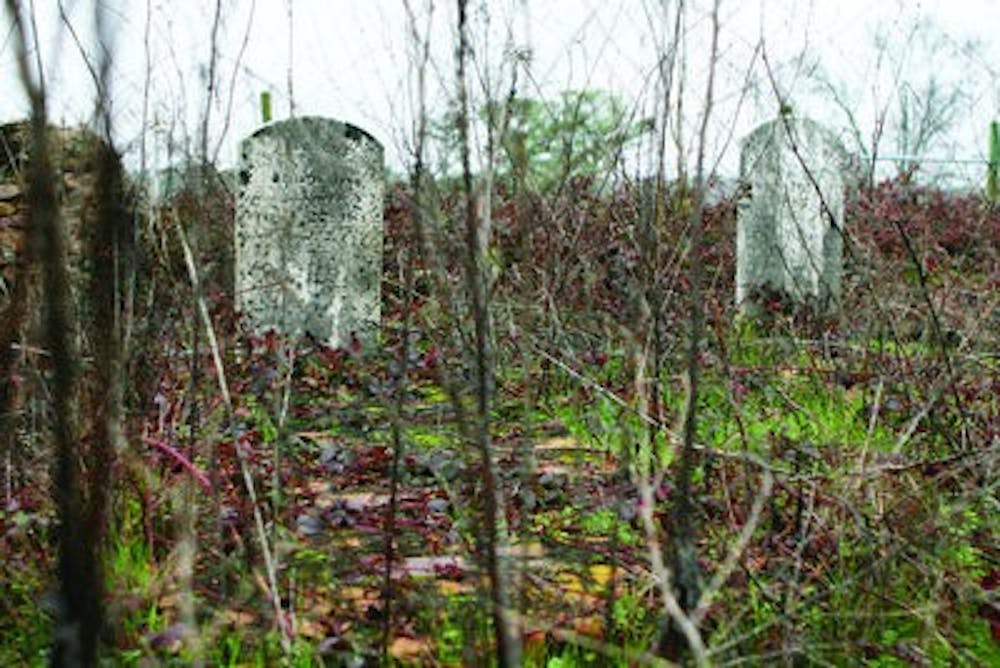Few are aware that, among the livestock of the Auburn Veterinary School, there lies a cemetery older than Lee County, itself.
Now the Auburn Heritage Association wants to restore this landmark for future use.
The Pinetucket Cemetery, a Civil War-era cemetery owned by H.D. and Mary Norman is located in the cow pasture of the Wilson Beef Lab on Wire Road.
One hundred and fifty years ago, Federal Wire Road, the predecessor to its modern namesake, ran from Savannah to New Orleans. Along this road, in the fledgling town of Auburn, there sat a tabernacle and a cemetery.
Federal Wire Road no longer exists, and the tabernacle is gone--in its place is the Auburn Veterinary School. The cemetery remains hidden from plain sight by groves of trees on both sides and is now visited most frequently by cows and their handlers.
"They say we got ghosts over here," H.D. said.
Each year the AHA, with the help of the Alpha Pi Omega service fraternity, combats the weeds and overgrown brush. Mary, however, wants a permanent solution.
"We're going to go and clean it off again," Mary said. "We're going to rebuild the rock wall. We're going to re-sod around it and maintain it."
The cemetery sits atop one of the highest points in Auburn and provides visitors with a sweeping view of the town.
"It's a very beautiful place," H.D. said. "We want to make it memorable where people can walk in, sit down and have a picnic."
Despite its panoramic view, the cemetery has faded from memory of many Auburn residents because of its secluded location.
Joseph Warren, freshman in political science, has lived in Auburn for 10 years and had never heard of Pinetucket until recently.
"They ought to restore it, if only out of respect for ... the people buried there," Warren said.
The restoration is predicted to be finished within the next year and cost about $10,000, Mary said.
The burial ground is estimated to contain about 50 people, including two Confederate soldiers and Lewis "L.A." Foster, a key contributor to the rise of Auburn both as a city and an educational haven.
Despite being outside city limits at the time, Foster established Pinetucket as a self-sustaining community with a store, church, school and numerous factories, including the brickworks mill that produced the materials to build Samford Hall.
He is also the fourth-great uncle of Mary Norman.
Dating back to the 1860s, the Pinetucket Cemetery preceded the establishment of Lee County and was but a small slice of the 1,280-acre Pinetucket estate owned by Foster.
Five hundred of the campus' 1,900 acres were bought from the Foster family.
The cemetery was one of the last plots of land sold to the University, not leaving the Foster family until 1942. The use of the site as a hog pen and the subsequent desecration of the graves eventually led Auburn to close the road and provide the Normans access.
Family cemeteries usually only last about two to three generations, H.D. said. Pinetucket has lasted for eight.
"Hopefully with my help and the help of the Auburn Heritage Association, which will hopefully go on long after I'm gone, it will continually be maintained," Mary said. "I'll probably be buried there."
Despite the long tenure of the cemetery as the family grave, the Normans stress that it has been, and always will be, both a family and a community grave.
Do you like this story? The Plainsman doesn't accept money from tuition or student fees, and we don't charge a subscription fee. But you can donate to support The Plainsman.





